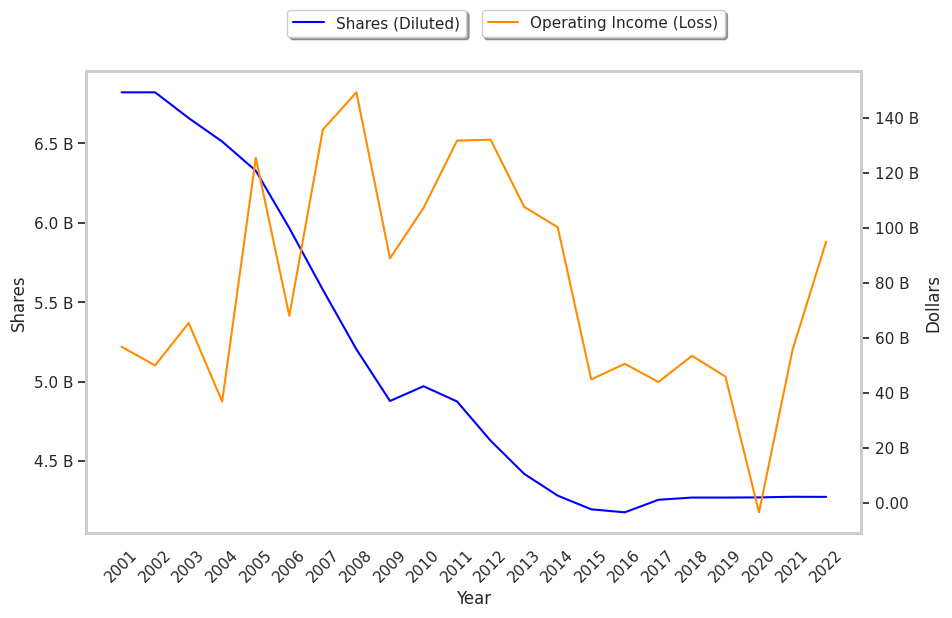Now trading at a price of $107.09, Exxon Mobil has moved 0.6% so far today.
Exxon Mobil returned gains of 7.0% last year, with its stock price reaching a high of $120.7 and a low of $97.4. Over the same period, the stock underperformed the S&P 500 index by -13.0%. As of April 2023, the company's 50-day average price was $112.06. Exxon Mobil Corporation engages in the exploration and production of crude oil and natural gas in the United States and internationally. Based in Irving, TX, the large-cap Energy company has 62,000 full time employees. Exxon Mobil has offered a 3.4% dividend yield over the last 12 months.
The Business Has Weak Operating Margins:
| 2018-02-28 | 2019-02-27 | 2020-02-26 | 2021-02-24 | 2022-02-23 | 2023-02-22 | |
|---|---|---|---|---|---|---|
| Revenue (MM) | $238,983 | $279,332 | $259,497 | $179,770 | $278,983 | $402,217 |
| Gross Margins | 33.0% | 31.0% | 30.0% | 31.0% | 31.0% | 32.0% |
| Operating Margins | 18% | 19% | 18% | -2% | 20% | 24% |
| Net Margins | 8.0% | 7.0% | 6.0% | -12.0% | 8.0% | 14.0% |
| Net Income (MM) | $19,710 | $20,840 | $14,340 | -$22,440 | $23,040 | $55,740 |
| Net Interest Expense (MM) | -$601 | -$766 | -$830 | -$1,158 | -$947 | -$798 |
| Depreciation & Amort. (MM) | -$19,893 | -$18,745 | -$18,998 | -$46,009 | -$20,607 | -$24,040 |
| Earnings Per Share | $4.63 | $4.88 | $3.36 | -$5.25 | $5.39 | $13.04 |
| EPS Growth | n/a | 5.4% | -31.15% | -256.25% | 202.67% | 141.93% |
| Diluted Shares (MM) | 4,256 | 4,270 | 4,270 | 4,271 | 4,275 | 4,274 |
| Free Cash Flow (MM) | $45,468 | $55,588 | $54,077 | $31,950 | $60,205 | $95,204 |
| Capital Expenditures (MM) | -$15,402 | -$19,574 | -$24,361 | -$17,282 | -$12,076 | -$18,407 |
| Net Current Assets (MM) | -$107,057 | -$99,695 | -$113,607 | -$123,727 | -$104,086 | -$68,963 |
| Long Term Debt (MM) | $24,406 | $20,538 | $26,342 | $47,182 | $43,428 | $40,559 |
| Net Debt / EBITDA | 0.61 | 0.48 | 0.67 | 1.48 | 0.54 | 0.1 |
Exxon Mobil has weak revenue growth and a flat capital expenditure trend, irregular cash flows, and just enough current assets to cover current liabilities. We also note that the company benefits from low leverage and a strong EPS growth trend. However, the firm suffers from slimmer gross margins than its peers and weak operating margins with a stable trend.
Exxon Mobil's Valuation Is in Line With Its Sector Averages:
Exxon Mobil has a trailing twelve month P/E ratio of 9.0, compared to an average of 7.54 for the Energy sector. Based on its EPS guidance of $9.15, the company has a forward P/E ratio of 12.2. The company doesn't provide forward earnings guidance, and the compound average growth rate of its last 6 years of reported EPS is 18.0%. On this basis, Exxon Mobil's PEG ratio is 0.5. Using instead the 10.0% weighted average of Exxon Mobil's earnings CAGR and the broader market's anticipated 5-year EPS growth rate, the company's PEG ratio is 0.9, which implies that its shares may be underpriced. In contrast, Exxon Mobil is likely overvalued compared to the book value of its equity, since its P/B ratio of 2.15 is higher than the sector average of 1.68. The company's shares are currently trading -9.2% below their Graham number.
Exxon Mobil Has an Analyst Consensus of Some Upside Potential:
The 21 analysts following Exxon Mobil have set target prices ranging from $110.0 to $150.0 per share, for an average of $125.81 with a buy rating. As of April 2023, the company is trading -10.9% away from its average target price, indicating that there is an analyst consensus of some upside potential.
Exxon Mobil has a very low short interest because 1.1% of the company's shares are sold short. Institutions own 60.7% of the company's shares, and the insider ownership rate stands at 0.06%, suggesting a small amount of insider investors. The largest shareholder is Vanguard Group Inc, whose 10% stake in the company is worth $41,576,992,530.



